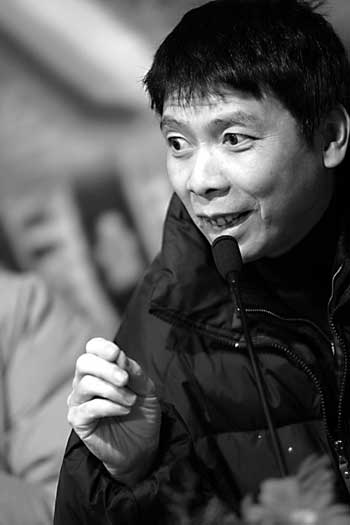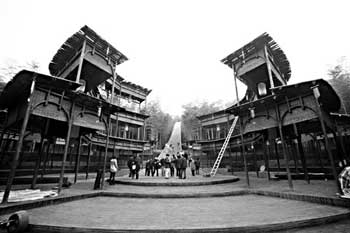| Tools: Save | Print | E-mail | Most Read |
| Chinese Director Pins His Hopes on an Oscar |
| Adjust font size: |
Feng Xiaogang, a Chinese mainland film director, as popular as, if not more popular than Zhang Yimou at home, is working on a film to draw the attention of international viewers. His new offering, The Banquet (Ye Yan, which literally means night banquet), will hit cinemas in late September in the hope of becoming an Oscar candidate, according to the movie's producer. Shooting was wrapped up in early January but the film still awaits a lengthy post-production stage with five months scheduled to create special effects. The director is well known in The Banquet was originally scheduled to be released in late December or early January, the hottest time to screen movies in But the desire to become an Academy Award candidate in the Best Foreign Language Film category has driven the production team to speed up their work since to qualify for this, a film has to have been screened for at least one week before October. "The exact screening date will depend on when the post-production stage is finished, but it definitely will not be the end of the year because The Banquet is running for this year's Oscar nomination," said Wang Zhonglei, president of the movie's production company Huayi Brothers. According to earlier reports, a 20-minute trailer will be shown during the coming Cannes Film Festival, and special screenings at Toronto International Film Festival and Venice International Film Festival this September were also planned.
Feng specifically selected a cast and crew for The Banquet in an attempt to draw international attention, following in the footsteps of Ang Lee's Crouching Tiger, Hidden Dragon, or Zhang Yimou, whose Hero (Ying Xiong) made record box-office success. For the first time, Feng put aside his strongpoint of depicting contemporary lives and set the story in ancient Dazzling gravity-defying flying and fighting, are some of the essential elements that lead to the international popularity of Crouching Tiger, and will also therefore heavily feature in The Banquet, which will be labeled as Feng's first kung fu movie. In his biggest-budget movie to date, Feng has procured martial arts specialist Yuen Woo Ping as action choreographer and executive producer, Tan Dun as composer and Tim Yip as arts director. The trio worked on Crouching Tiger, with Yip and Tan picking up Academy Awards for their efforts. Zhang Ziyi, whose fame as the hottest Chinese star is ever increasing internationally though not so much among her compatriots, plays the leading role. "She has a lot of influence in The movie also stars mainland comic favorite Ge You, Feng's long-time movie partner, who has appeared in six of Feng's films including Big Shot's Funeral (Da Wan'er) and Cell Phone (Shou Ji). Ge is perhaps best known throughout the world for his role in Zhang Yimou's 1994 classic To Live (Huo Zhe). The movie's star-studded cast also includes one of the hottest mainland actresses Zhou Xun and So far costing US$20 million, The Banquet is already US$5 million over the initial budget. Members of the cast had to travel through North China's Inner Mongolia Autonomous Region, East China's Story of revenge Described as a loose adaptation of Hamlet, The Banquet is a story of revenge by a member of the imperial family in the Tang Dynasty (618-907). The new Emperor (played by Ge You) has seized the throne by murdering the previous Emperor. He marries the Empress (Zhang Ziyi), wife of the previous Emperor and stepmother to the Crown Prince (Daniel Wu). The Crown Prince then seeks revenge with the help of his stepmother. At first, the Empress seeks only to protect herself, but as the new Emperor grows suspicious of all those around him, she realizes that only by helping the Crown Prince to kill him can she hope to survive. Together with the Chief Minister, she tries to carry out this plot, but when the Prince is wracked with indecision she devises a new plan and seeks the throne for herself. As the plot moves towards its climax, the Emperor calls for a lavish royal banquet, where each plots to end the lives of their enemies. According to the director, though the storyline of The Banquet is similar to that of Hamlet it will not feature any kind of visit from a spirit of the dead. Another difference between the two stories, according to Feng, is that The Banquet does not focus on the prince, but examines the feelings of everyone involved. International interest Although his name is unfamiliar outside Most of his movies are blockbusters and have raked in huge profits, especially his previous two works, A World without Thieves and Cell phone. The two movies' box-office revenues ranked first and third in 2003 and 2004 respectively, making Feng one of the most successful commercial film directors in While internationally celebrated directors such as Zhang Yimou and Chen Kaige have faced criticism at home for pandering to Western audiences and awards committees, Feng's movies are all set in contemporary But his influences mainly centre in Northeast, Northwest and North China, with "I think it's most important to get Chinese audiences' approval. If you can't be accepted by your own people, it's hard to get others' respect," the 48-year-old director was reported as saying. In 2001 he collaborated with Columbia Pictures' Asian division to make the dark comedy Big Shot's Funeral, in which veteran film icon Donald Sutherland played a film director believed to have died in The film's digs at the social changes that have swept The lessons of Big Shot's Funeral informed Feng's decision to make The Banquet. "It seems like Western audiences have an easier time accepting Asian stories set in ancient times. That is a reality. I don't think it is a good thing, but for me, I wanted to make that kind of change." But Feng says regardless of style change or international interest, he will not change his basic focus on the masses. "You can go from a comedy to a tragedy, but it shouldn't affect whether a movie is good or not. I won't go and make an empty film that leaves people wondering what it meant after they see it. Like in my previous movies, my aim is to bowl my audience over," Feng said.
One of the outdoor scenes of "The Banquet" in Anji, Zhejiang Province.
( |
| Tools: Save | Print | E-mail | Most Read |
 |
| Related Stories |
|
Product Directory China Search |
Country Search Hot Buys |

